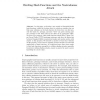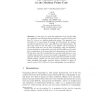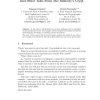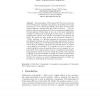113
Voted
EUROCRYPT
2006
Springer
15 years 4 months ago
2006
Springer
We present the first aggregate signature, the first multisignature, and the first verifiably encrypted signature provably secure without random oracles. Our constructions derive f...
116
Voted
EUROCRYPT
2006
Springer
15 years 4 months ago
2006
Springer
We propose simple, realistic protocols for polling that allow the responder to plausibly repudiate his response, while at the same time allow accurate statistical analysis of poll ...
105
Voted
EUROCRYPT
2006
Springer
15 years 4 months ago
2006
Springer
Abstract. Motivated by the problem of protecting cryptographic hardware, we continue the investigation of private circuits initiated in [16]. In this work, our aim is to construct ...
100
Voted
EUROCRYPT
2006
Springer
15 years 4 months ago
2006
Springer
In this paper, we develop a new attack on Damg
EUROCRYPT
2006
Springer
15 years 4 months ago
2006
Springer
135
Voted
EUROCRYPT
2006
Springer
15 years 4 months ago
2006
Springer
In this paper, we study the application of the function field sieve algorithm for computing discrete logarithms over finite fields of the form Fqn when q is a medium-sized prime po...
104
Voted
EUROCRYPT
2006
Springer
15 years 4 months ago
2006
Springer
Non-interactive zero-knowledge (NIZK) proof systems are fundamental cryptographic primitives used in many constructions, including CCA2-secure cryptosystems, digital signatures, an...
EUROCRYPT
2006
Springer
15 years 4 months ago
2006
Springer
107
Voted
EUROCRYPT
2006
Springer
15 years 4 months ago
2006
Springer
Sequence compression is one of the most promising tools for strengthening pseudo-random generators used in stream ciphers. Indeed, adding compression components can thwart algebrai...
102
Voted
EUROCRYPT
2006
Springer
15 years 4 months ago
2006
Springer
The Isomorphism of Polynomials (IP) [28], which is the main concern of this paper, originally corresponds to the problem of recovering the secret key of a C scheme [26]. Besides, t...




